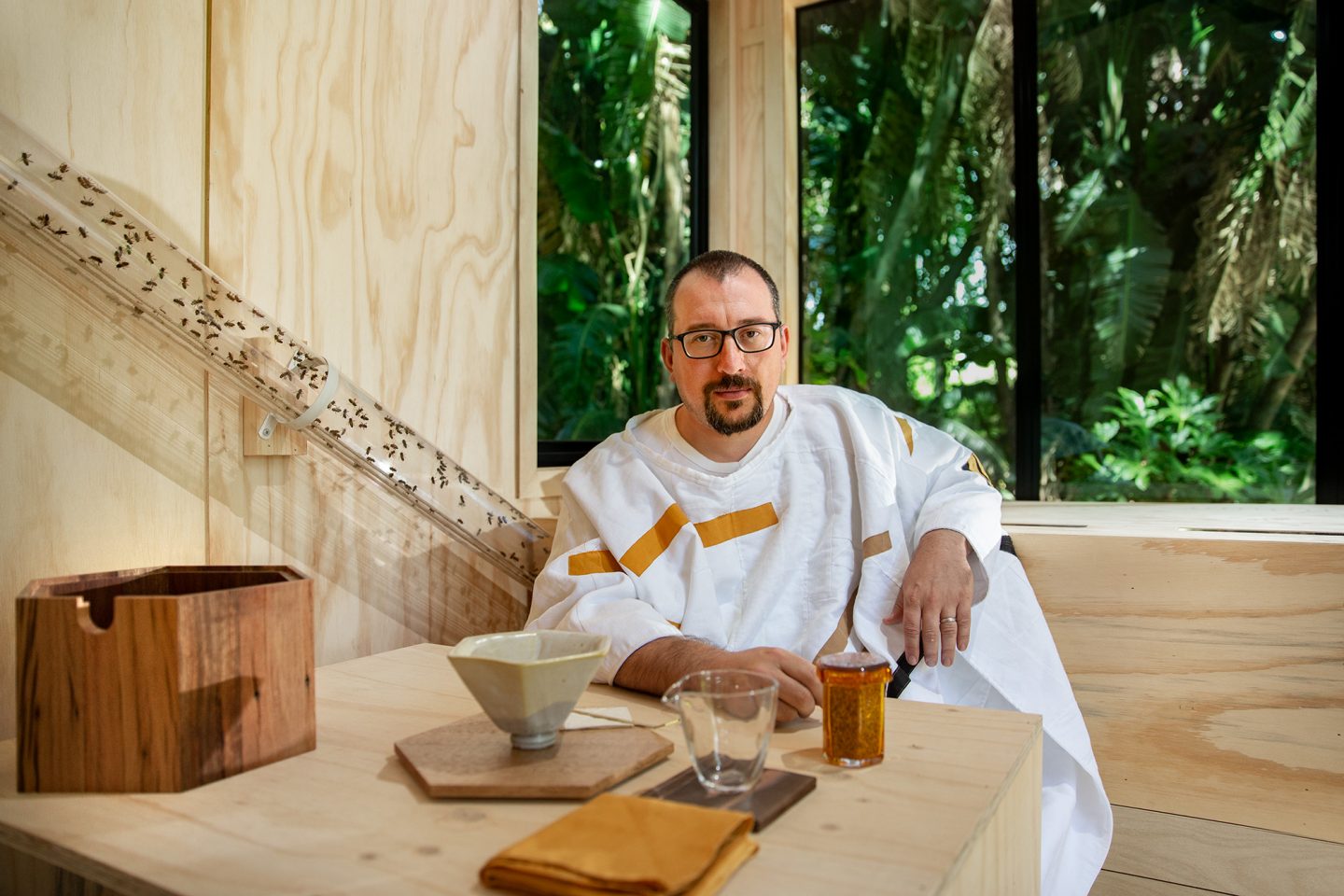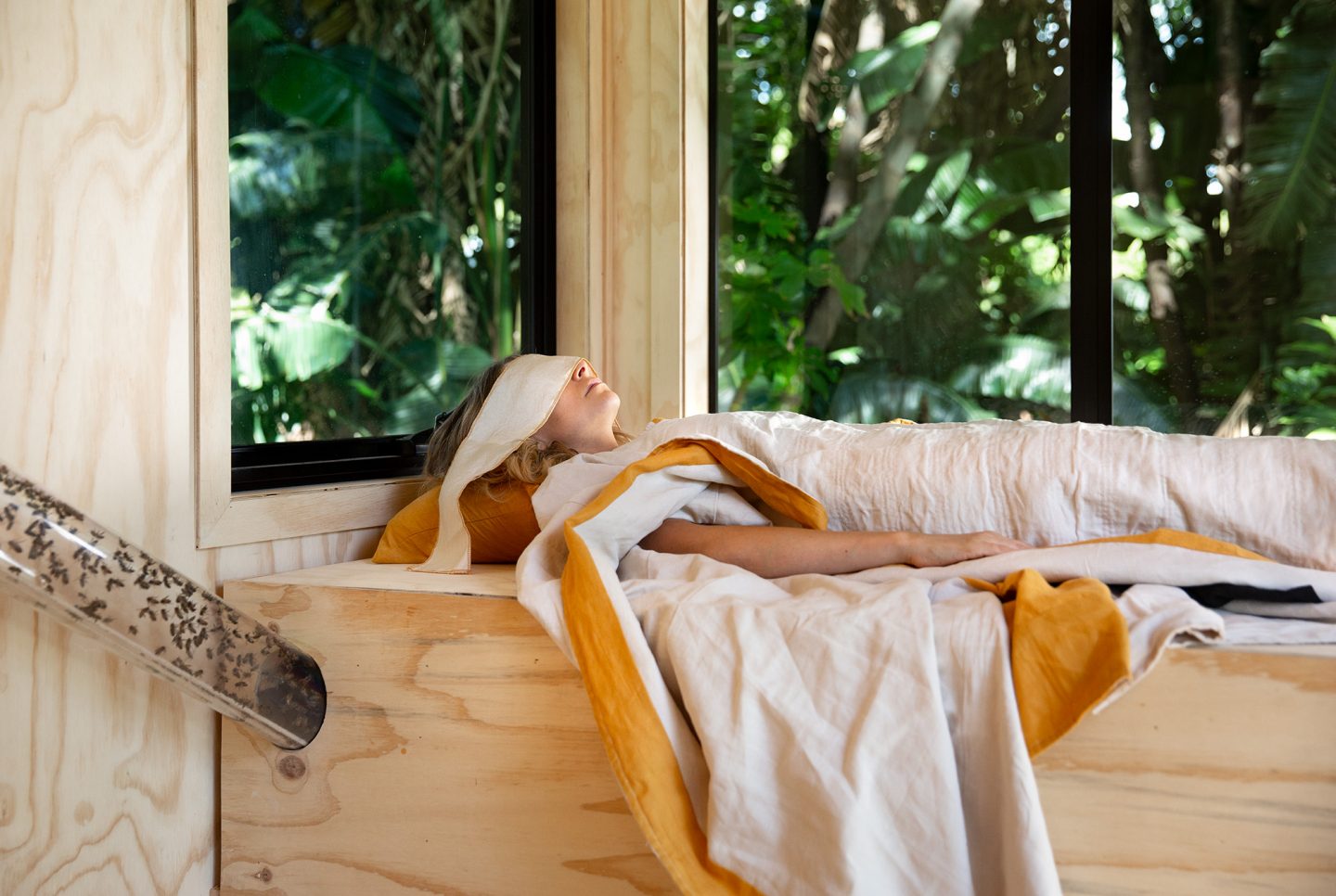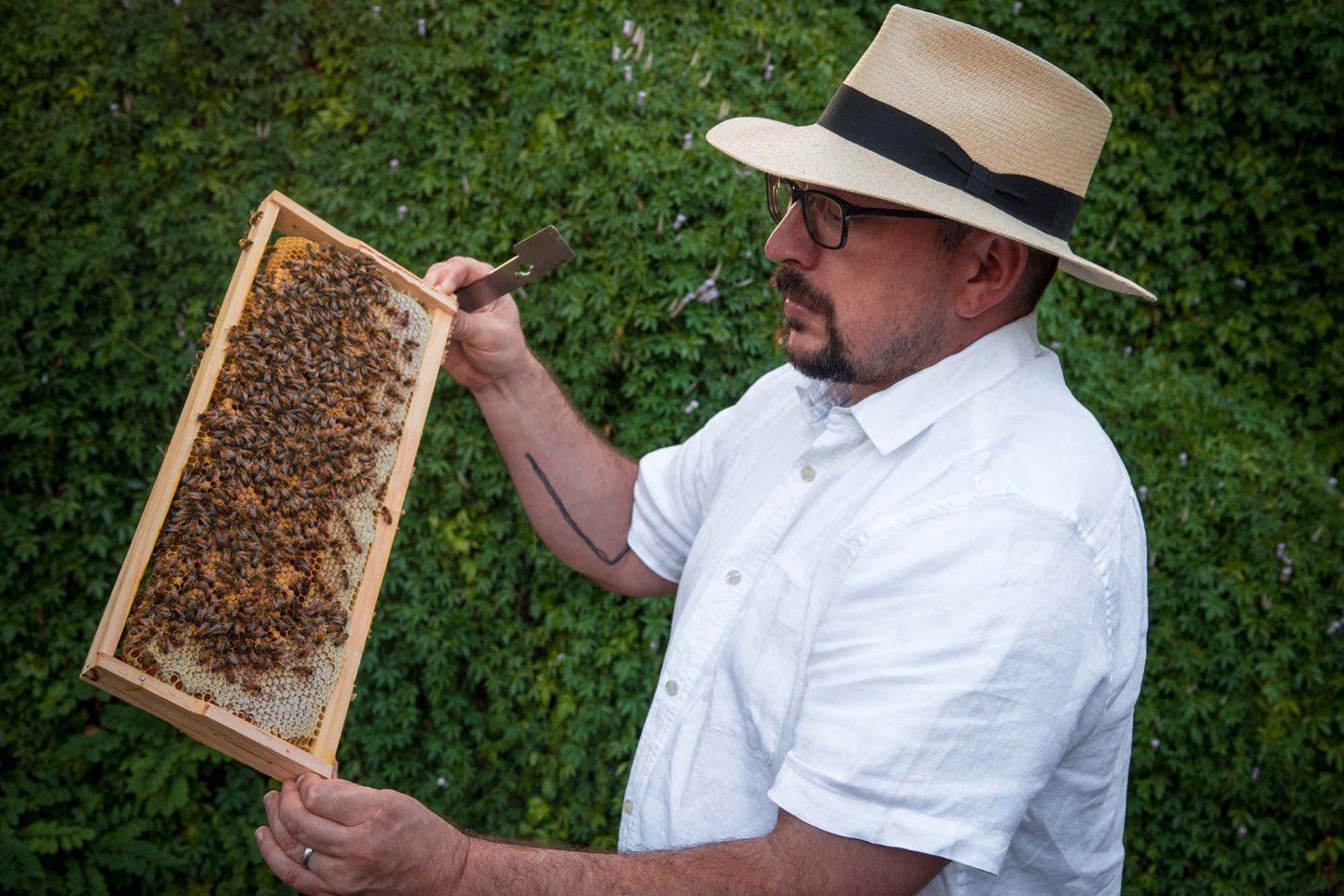
Walter Marsh
Walter is a writer and editor living on Kaurna Country.

In a ‘tiny house’ turned human-scale beehive in the Adelaide Botanic Gardens, Adelaide Biennial artist Mike Bianco hopes to bring us a little closer to the European honey bee and its complex place in our ecosystems.
“There’s this joke that beekeepers are the absolute most evil landlords,” Mike Bianco tells The Adelaide Review. “We just break in every once in a while, and steal all their savings.”
A love of cooking prompted the Perth-based artist to engage more deeply with the species essential to a third of all food production. Now, Bianco’s honey bee-centric work is a reflection on how humans engage with the natural world in ways that are sometimes good, sometimes bad, but always complicated.
“We’ve produced this industrialised food system that is very brittle,” he says. “What I mean is it’s designed to produce surpluses, and so in that sense is meant to be strong. But at the same time, like iron it has this ability to break. I think one of the great examples of how brittle it is is the fact that the American food system is largely dependent on this one pollinator, despite there once being this rich variety of native pollinators on the continent.”
Of the many ecological and social issues that fill our social media feeds, ‘the bees are dying!’ is often shared but rarely understood. But Bianco’s aim isn’t a simple, placard-friendly call to ‘save the bees’, but instead to “demystify and deescalate people’s anxieties” around the insect, and navigate those complexities and contradictions.
“Really the honey bee as we know it was introduced to America from Europe in the 17th century, and in Australia I think it’s early 19th century. So honey bees are actually very, very new on this continent, and they’re part of a settler colonial project, they’re about taking a Eurocentric food system and exporting it.
“People ask ‘are they invasive?’, and they’re not necessarily. In a Western Australian context honey bees are a major stressor for native endangered black cockatoos because they take up their nesting cavities. Bees are absolutely vital, and essential to our food system, but they’re one of many species we need to be taken care of – they’re kind of a gateway species.

“What I’m trying to do through these conversations is do the kind of work we all need to be doing, which is engaging complexity. For way too long we’ve relied on simple answers, and when we get into things like climate change and species extinction, these are not simple things.”
Building on Bianco’s 2016 Bee Bed installation at the Perth Institute of Contemporary Art, his Adelaide Biennial work will see him collaborate with locally-based tiny house company CABN to install a kind of human-scale hive in the Adelaide Botanic Gardens, populated by bees sourced from a local urban beekeeper (“From his mom’s backyard,” Bianco says) . Inspired by a Ukrainian tradition where beekeepers sleep alongside their bees, the Anthrocomb invites visitors to engage with these creatures in a new space, in a new way.

“[The honeycomb] is what bees build out of wax, and serves a lot of purposes. It stores honey, but it’s also the space where they rear and care for their young. It’s a kind of intergenerational space. So what I’m trying to create is a kind of interspecies space, a space of care. It’s a space for resting with honey bees.”
While in the Anthrocomb, Bianco will engage visitors in a kind of bee-centric tea ritual that includes pollen tea, a ceremonial poncho based on larvae anatomy and an invitation to reengage the senses while surrounded by bees – albeit safely separated by plastic barriers. “Certainly in a fine art context we tend to privilege sight, so it’s about trying to engage all these senses – taste, smell, sound and touch,” he says.
“When you get into a hive there are all these amazing smells; it could be the honey but it could be the pheromones the bees give off – they communicate by scent. And then these beautiful sounds – people tend to think bees make one sound, they buzz, but they actually make all kinds of sounds – they chirp, there’s all kinds of hums. I wanted to figure out a way to share that with people without them having to get into a hive.”
For some, this might seem a particularly literal interpretation of the Biennial’s 2020 theme, Monster Theatres. “People are really freaked out about bees,” Bianco admits. “And from my perspective a lot of that has to do with popular media from the 20th century. There were all these monster movies that were made about killer bees.
“Ahhh, not the bees!” he says, echoing the oft-shared clip of Nicolas Cage in The Wicker Man.
Indeed, while setting up the Anthrocomb last week, Bianco heard people compare the roar of the Adelaide 500 car race to the sound of bees. “That’s just what bees sound like when they’re pissed,” he says.
“There’s this idea that bees are going to attack us – and there are very defensive bees in the world – but the truth is we do have this very, very old relationship with bees. Any beekeeper can tell you if you work with them properly it’s actually a very peaceful and calm experience.
“What’s amazing is once you’ve had that experience you could just be walking along and all of a sudden you will smell a hive in a way you never knew before, and look and see a feral beehive in a tree. Or you’ll hear them differently, and it does the work which is about perceiving things beyond sight, and connecting.”
Which is itself a metaphor for the kind of thinking our own species will need to navigate all those other intersecting crises on our doorstep. “There was the Enlightenment, there was the Industrial Revolution, and we’re going through an ecological revolution right now,” he says of the future and its many unknowns. “It’s this thing that haunts us, that terrorises us, it’s this between state that we cannot yet name. We are in that monstrous space, which is ‘what is this new world that were going to live in?’
“Is it napping with bees, talking to trees is it turning our shit into oysters? What is this really strange, potentially revolutionary moment that is monstrous. Because we do not yet know.

Walter is a writer and editor living on Kaurna Country.